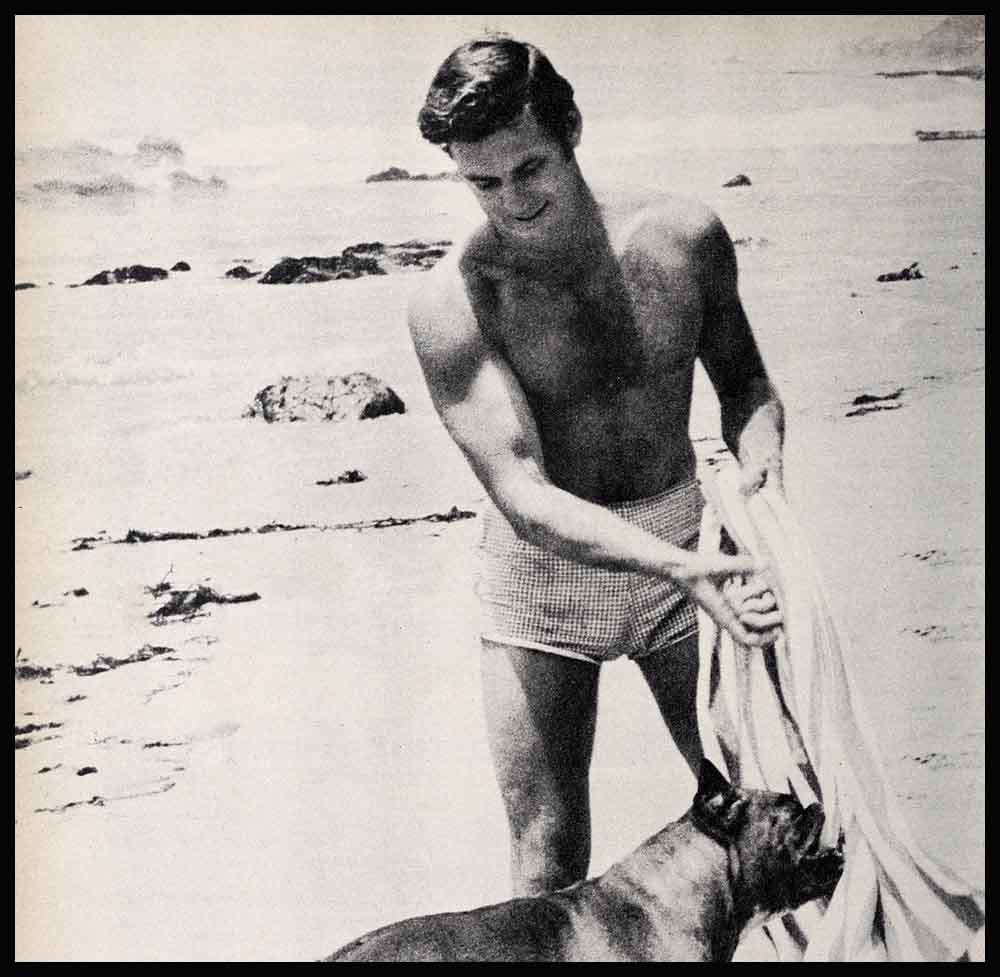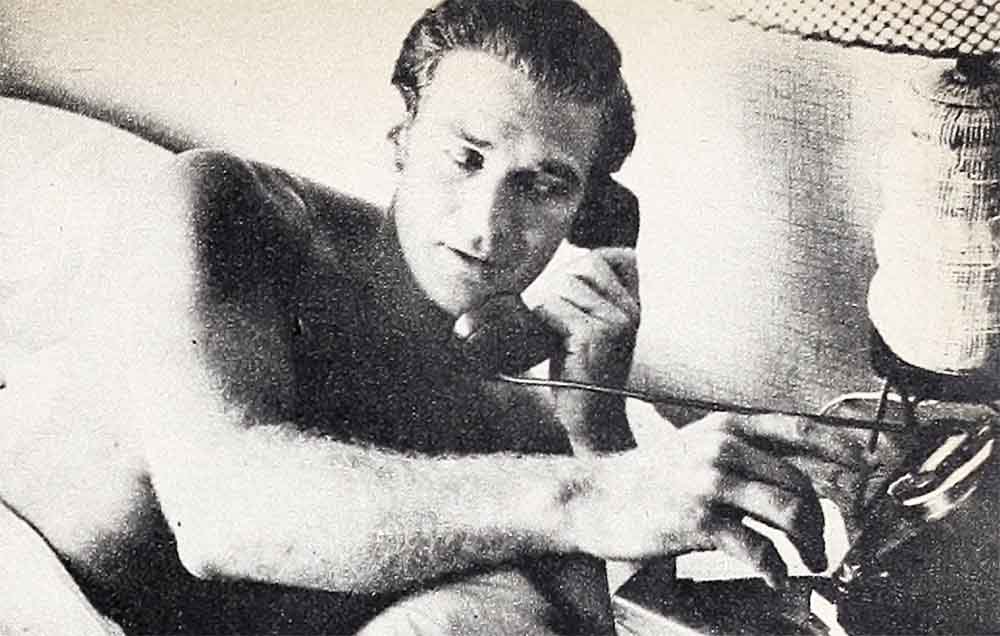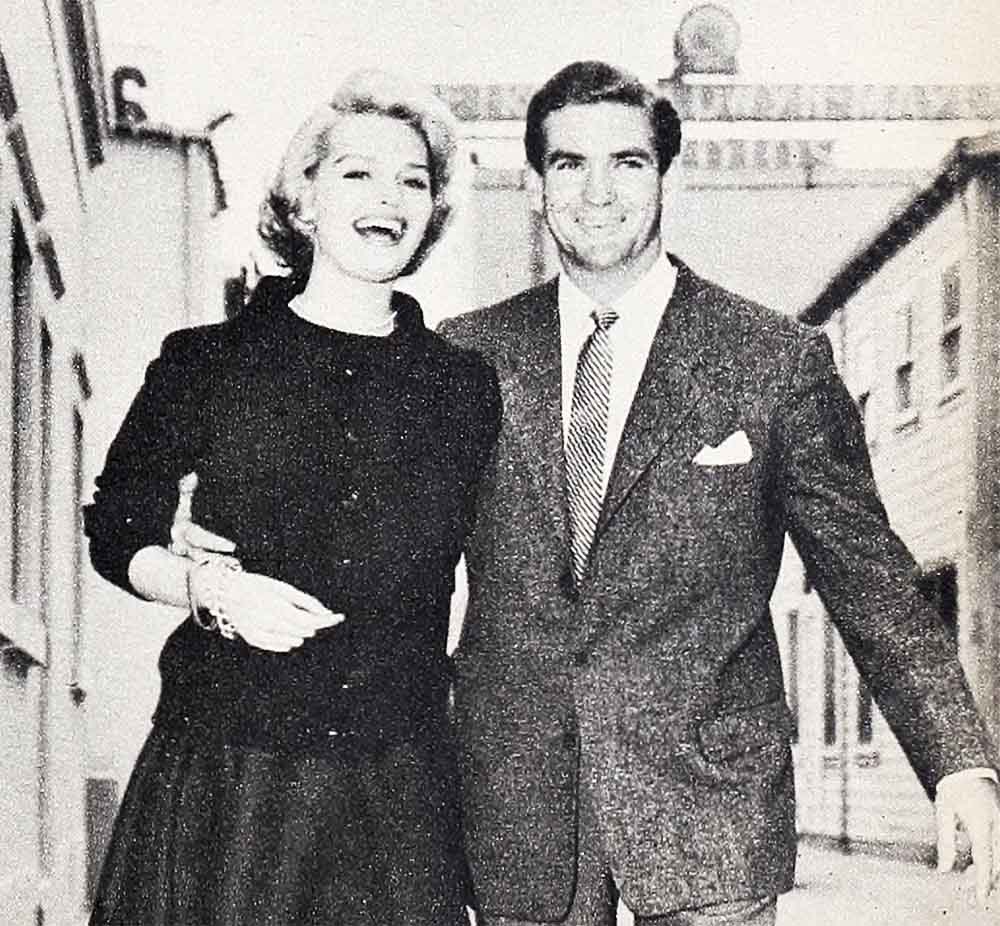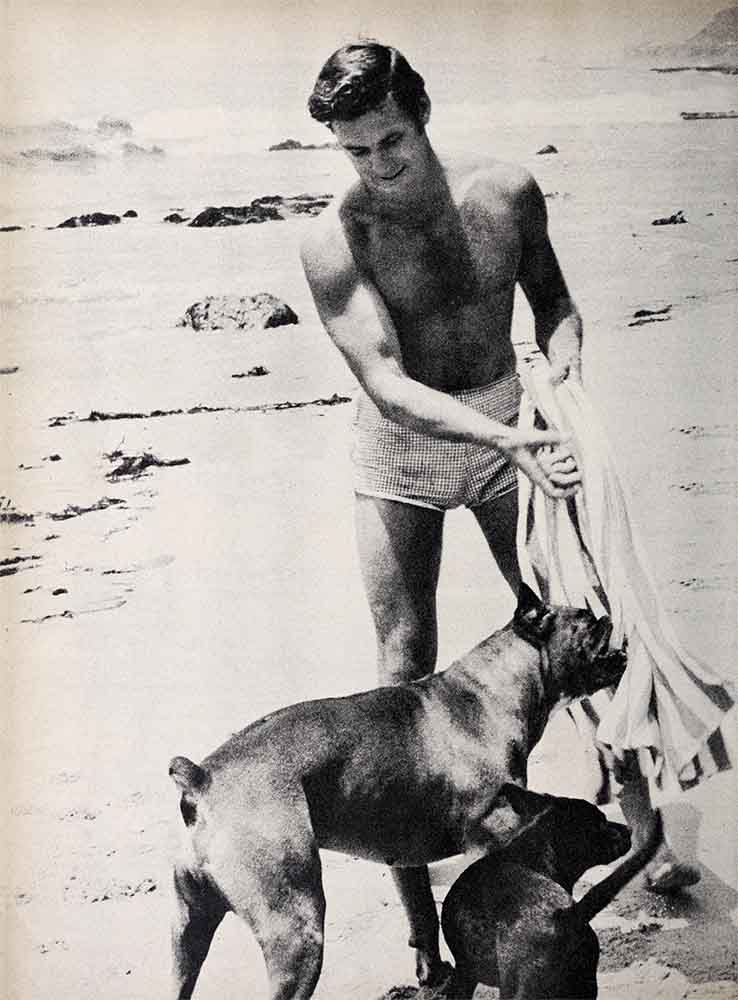
A Long Way From Home
Most mornings before the sun has risen too high in the sky, a tall, dark young man in bathing shorts steps from a modest beach house at Malibu, stretches his arms into the air and looks out over the Pacific before racing across the sand for a dip. Gazing into the distance across the blue water, Rod Taylor, the young Australian who has made such a hit in “Giant” and “Raintree County,” probably is thinking of home and what a long way he has come to put his mark on the Hollywood scene.
Rod, who shares the beach house with Jeff Richards, an M-G-M player, and Bob Walker, casting director of Review Productions, at first glance lacks most of the outward signs of so many Hollywood hopefuls who are trying to crack the sound harrier of stardom. He is not handsome in the conventional Hollywood sense. Clad in blue jeans and a stained sweat shirt, he might easily be mistaken for a young lumberjack about to enter a log-rolling contest. Wearing high-heeled boots and a wide-brimmed hat, he could pass for a stunt rider in a shoot-’em-up Western. His square-built frame is solidly packed, his face unremarkable except when he smiles. Then a warmth shines through and one ceases to be concerned with actorish good looks and becomes content with his ingratiating friendliness backed by an inquiring mind.
AUDIO BOOK
The beach house, for instance, poses a problem which could become more acute as Rod’s popularity soars, which it seems certain to do. “There are few moments in our menage,” says Bob Walker, “when the place isn’t jumping. The beach is an attraction, of course, but I think it’s Rod they want to see. People seem to gravitate toward him, warmed by his naturalness and lack of pose.”
This has, to some extent, been a hardship on the young actor who is so unaffectedly gregarious. So, even when he would like to be alone or sit before the big front window and watch the Pacific breakers pile up on the beach, he never lets this become apparent to guests who just “drop in.” These people, it must be said, are not free loaders. They are simply young folk who like Taylor’s ingenuous boyishness, his sincerity and continuing capacity for astonishment at the big, complicated yet kindly country in which he finds himself.
So he greets them with his kid-around-the-corner smile and, if mealtime is imminent, concocts his now-famous Australian dish which he calls Greek lamb—something with as many ingredients as a hobo’s mulligan, and twice as appetizing. “It’s the only thing I can cook well,” Rod said. “Jeff and Bob are almost visibly relieved when I pass up my turn as chef.”
Taylor’s emergence upon the American scene was the direct result of a philosophy arrived at early. There being no television in Australia and few little theatre groups, he decided that the only way to become an actor was to act, so he began beating on the doors of radio studios. He got what he was looking for—work. And soon, because of his facility with accents, particularly American, he was doing twelve-hour stints, day after day over the air waves; appearing also in stage plays. It was at this juncture of his career that writer-producer Marty Rackin appeared like a good angel on his horizon.
Coming to Australia with the intention of making a television series starring the late Robert Newton, Rackin heard that good actors could be had in the “down under” country for a song such as he could afford to sing. One night while listening to a radio story called “The Informer,” he heard a young fellow playing the part of a Brooklyn hoodlum. His accent was so perfect that Rackin was sure this was no Australian, but probably an American actor temporarily beached in Sydney. He quickly got in touch with the performer and found a fresh-faced youth, an’ Australian, whose bright blue eyes looked at him with the wistful longing of a country pup in a big city. “I asked him the usual question: ‘How’d you like to be in pictures?’ ” Rackin said, “and he reacted exactly as if I’d offered him a million dollars.
“We were doing ‘Long John Silver,’ ” Rackin went on, “actually a sequel to ‘Treasure Island,’ with Guy Dolman in the lead, playing the part of a blind man. To create the realistic effect of sightless eyes, we decided to use contact lenses with a kind of milky cloudiness in them. After a few tries, Dolman said he simply couldn’t wear the lenses and would have to withdraw from the role. At my wit’s end, I began frantically searching my mind for some actor to play the part. It was then that I thought of young Taylor. I sent for him and he jumped at the chance like a hungry trout. But right then I got the surprise of my life. Rod wouldn’t accept the assignment unless Dolman told him personally that the role was his. Being accustomed to certain Hollywood actors who’d steal a hot stove, I was dumbfounded. This was loyalty and principle beyond my experience.”

Rackin went on to explain how sincerely Taylor plays any role given him. “There was a sort of chase in the picture,” he went on, “in which Rod, a completely blind man, had to run over terrain known to him only by touch, and he went at it exactly as if he were sightless. once he banged into a tree and another time fell over a boulder, cutting his hands and gashing an arm. When I protested, he said quite calmly: ‘A blind man gripped by terror would run into trees and stumble over rocks.’ Well, that stopped me. The fact that he had injured himself didn’t count at all.”
Having watched young Taylor turn in a remarkably professional performance, Rackin was more than ever convinced that the youth was entitled to his chance in greener pastures.
It was at this point that a lucky incident occurred. Rod won the Macquarrie Award, given by newspapers to worthy young actors, enabling them to go to England for further study and experience. Rackin, while not disparaging the opportunities awaiting Rod in the tight little island, managed by subtle suggestions to point out alluring pictures of America, mentioning a couple of other Taylors, Bob and Elizabeth, who had done pretty well for themselves in Hollywood. This, coupled with the magic names of Clift and Brando, convinced Rod that heaven began and maybe ended in Hollywood, where everyone is supposed to ride around in solid gold Cadillacs.
Now that Rod’s future seems comfortably established, he is inclined to look with a touch of nostalgia to the hard, work-filled scenes of his adolescence. Reared as the only child of comfortably well-off parents in Sydney—his father is a construction engineer and his mother a successful novelist and short story writer—Rod started out to be an artist, studying in the Sydney Technical and Fine Arts College. “I was a show-off, an arty brat of a kid,” he said, “and believed myself to be the possessor of an outstanding talent. Then I took a flier in amateur theatricals and got bitten by the bug for which there seems to be no known cure. When Laurence Olivier and the Old Vic Company visited Sydney, I knew for sure that I wanted to be an actor. It was then that I began to get rid of that phony attitude and discovered that there is no substitute for a sincere, honest approach to a job. Not at first, though. I got work scrubbing floors at night so I could walk around day times looking like an actor. I must have been an awful pain in the neck.”
About that time, when he was twenty-one, the actor met, fell in love with and married a pretty model who was just a little younger than he. Neither of them being burdened with much marital wisdom, career jealousy soon reared its ugly head. They were both miserable through two and a half years, at the end of which time they were divorced.
Now twenty-six, Rod views marriage, at least for him in the foreseeable future, with a somewhat skeptical eye. Because he’s still fearful that he might not measure up to the high expectations which the officials at Metro-Goldwyn-Mayer, where he is under contract, have for him. “More than anything else,” he says, “I want to make good as an actor. No, not just make good, either. That isn’t enough. I want to get up there with a couple of stars I used to dream about when I was trying to get my foot on the first rung of the ladder back in Sydney—Brando and Clift. Maybe I haven’t got what it takes; only time will reveal that. But if I don’t make it—and there are a lot of fine actors around who haven’t—I wouldn’t want a wife to share the bitterness of failure.”

In talking to directors who have worked with him in pictures, it would seem that this fear is not well founded. “He acts the way he is,” says Richard Brooks, who directed him in “The Catered Affair.” “His Principal asset, as an actor and a person, is the fact that he listens well to a director and other players. His actions are all normal to the scene and honest, particularly in a role which will permit him to exploit his own personality. I predict that Rod Taylor will go straight to the top.”
George Stevens, who directed Rod in “Giant,” was equally definite. Stevens, no man to toss unearned compliments about, and certainly one of the finest directors in Hollywood, has said, “I found him to be an extraordinarily gifted player. He has many graces of the acting art plus an inimitable flair for pure mimicry. He had a difficult part in ‘Giant’ and made it outstanding. Taylor will most certainly be a star of real distinction.”
Jeff Richards, co-sharer of the beach house, who stars in “The Opposite Sex,” is an enthusiastic, yet objective admirer of Rod’s talents as an actor. “He isn’t the matinee idol type at all,” Jeff said. “Yet, curiously enough, I think he’ll be a smash hit with feminine moviegoers. His strong masculinity comes through with every gesture, and he has somehow managed to retain an ingenuous quality which appeals to the mother instinct in women. But he has the good sense not to overdo it.”
Rod’s social activities are not unique in Hollywood. He likes parties and goes to a lot of them. But night clubs dismay him He is forever asking himself why people pay so much money just to sit around little jammed-in tables in crowded, smoke-filled rooms.

No young man plentifully endowed with talent and natural charm long escapes attention, particularly in Hollywood, where studios are bulging with beautiful girls. Taylor, in his quiet, unpretentious way, has attracted quite a few of them, but he insists with his wide grin that the ones he goes out with have nothing more serious on their minds than a good movie and maybe a chocolate malted afterward. Nicola Michaels, a Metro-Goldwyn-Mayer starlet whom he squires about quite often, states with conviction that Rod is one of the “most comfortable” boys to go out with she has ever met. A bouncy girl with a cute mouth and a bridge of freckles across her small nose, she shakes her head positively at any suggestion that their friendship has the slightest implication of seriousness. “We have fun together,” she said. “Rod tries to think of I things a girl would like to do. He doesn’t need any prompting. Often we go out to his house and listen to his records and the waves thundering just outside the big front window. Sometimes Jeff whips up something—he’s awfully good at things you just pop into the oven—or Bob will cook a chicken. And maybe Rod will get to Work on that famous Australian dish of his.”
She paused a moment, then said with a wryly humorous smile: “One comment I’ve heard by others is that no girl has to wear a break-away jacket when she goes out with Rod.”
Now, with some first-rate pictures behind him, and poised on the brink of further successes, Rod Taylor is earnestly and happily on his way. Whatever fortune, a notoriously fickle dame, has in store I for him, no one can tell, least of all Rod. One thing may be said with certainty: He’ll keep on giving his career the old college try, like the good Aussie he is.
THE END
DON’T MISS: Rod Taylor in Warner Brothers’ “Giant” and M-G-M’s “Raintree County.”
It is a quote. PHOTOPLAY MAGAZINE MARCH 1957
AUDIO BOOK




